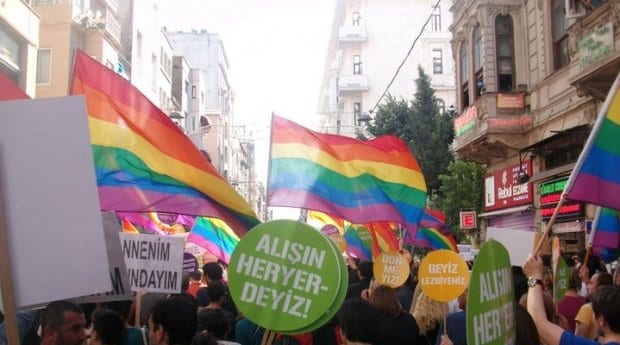In what local activists describe as a small but significant victory for the LGBT community, a Turkish court has fined a bathhouse owner for discriminating against a trans woman.
The verdict is seen as a step toward greater political and social support for LGBT people in this secularly ruled, traditionally Muslim country.
Lawyer Eren Keskin, who represented Ebru Kiranci in the case, told local news website Radikal that this verdict “will give confidence to trans individuals,” adding that “this may make life a bit easier” for them.
Kiranci, who changed her sex officially to become a woman 20 years ago, went to the historical Galatasaray bath on Dec 26, 2013, with a friend to use the facility. Ahmet Karaquney, who owns the 500-year-old bathhouse, would not let them in. “You absolutely cannot enter here,” he said. “We don’t let trannies here. Go to a bath of your own kind.”
Turkey decriminalized homosexual activities more than 150 years ago, in 1858; it also gave trans people the legal right to change their gender back in 1988. The LGBT activist community in Turkey is one of the strongest in the region, and the fight to win LGBT rights has been slow but steady.
Socially speaking, the city of Istanbul is known as one of the most gay-friendly cities in the Middle East. While the rest of Turkey is seen as a conservative traditional society, the cosmopolitan Istanbul, split between Europe and Asia, is known for being more relaxed around the concept of homosexuality, making it a nearby getaway for gay men from the region: Turkish, Kurdish and Arab alike.
Many Turkish gay men move from their hometowns to Istanbul seeking a refuge to live their lives freely without pressure from their families.
For discriminating against Kiranci, the owner of the bathhouse was fined 3,000 Turkish liras ($1,519 Canadian), according to Article 122 in the Turkish penal code. The article prohibits discrimination based on “language, race, colour, sex, political opinion, philosophical belief, religion, sect and similar reasons.”
“Ebru Kiranci’s court order is a big success and, of course, it can be used as an example for similar cases in future,” says Omer Akpinar, media coordinator of Kaos GL, Turkey’s first LGBT organization, which was officially registered in 2005.
While globally fictionalized as a hot hookup space for gay men, bathhouses in Turkey, Syria, Egypt and other Ottoman-influenced countries are actually part of a historical tradition. For centuries, men used the spaces as male-exclusive spas where they could get massages, have hot baths and spend an evening listening to Oud music and drinking heavy, over-sugared tea. Women also use bathhouse facilities on special occasions, such as an upcoming wedding or engagement.
In Istanbul, some bathhouses specialize in serving the local and visiting gay community, while others, such as Galatasaray, maintain their original, non-sexual purpose.
“Yes, some people go there every now and then and it is a more traditional way of socializing,” Akpinar says in an email correspondence, explaining that many bathhouses are not seen in the local culture to have any homosexual undertone. “It is not something necessarily gay; there is not a social stigma around it.”
The world-famous gay hamams (bathhouses) of Turkey remain active in Istanbul as well, welcoming local and foreign customers alike. However, fearing possible retribution from their neighbours or the local police, the owners of these businesses prefer to rely on word of mouth and tend to keep a lower profile than their non-sexual counterparts.
“Galatasaray bathhouse is not seen as a gay bathhouse,” says Alma, a Turkish trans woman. Alma smiles on Skype when asked if this interview might lead to any troubles for her. “Any step an LGBT person takes in the Middle East becomes a big story, even going to take a bath in a traditional bathhouse,” she replies. “I don’t want to end up on the cover of local newspapers.”
Alma refers to the photos of gay men dragged out of a bathhouse in Cairo, Egypt, last December. The men were arrested and accused of being homosexuals, but an Egyptian court acquitted the men of all charges.
Similarly, LGBT people in Turkey may face discrimination, harassment and even violence from their relatives, neighbours, co-workers and members of the Turkish police. However, in the backstreets off Istiklal Avenue, deep in the old neighbourhoods of Istanbul, you will notice rainbow flags hanging from some open windows or on the corners of the narrow streets. Local and regional LGBT activists turn these streets into their makeshift office. Because of the local community’s relentless work, Istanbul is the only Middle Eastern city to hold a yearly Pride celebration.
Alma remembers back in 2011, when she walked the streets of Istanbul with others during the Pride parade. “Activists and protesters stormed a local clothes shop and demanded an apology,” she says. “Days before the parade, shop owners refused to allow a trans person into the women’s changing room.”
“That was the day that I felt this community can support me through my own struggles,” she says. “It’s extremely hard to face the challenge of accommodating your true gender identity on your own, let alone trying to do that in a conservative country. These little steps give me hope.”
Akpinar is hopeful as well. “I must say that there is growing social and political support for LGBT rights, although the current government runs highly conservative politics,” he says.
He notes that the People’s Democratic Party, a newly formed political party, will attempt to run for parliament in this year’s Turkish elections. “It’s one of the biggest LGBT supporters, a pro-Kurdish party,” he explains. “Their presence might be quite determining for LGBT rights in the decision-making process.”
Despite the recent court ruling, many trans people still face discrimination in Turkey. “In the same community that ruled in favour of a trans person, companies wouldn’t consider transgender people for employment,” says Zafer, a Turkish gay man in his mid-20s who asked that only his first name be published because he is not out. “This ruling is a good step, but also I believe that [the local community] needs a much bigger awakening about these issues.”


 Why you can trust Xtra
Why you can trust Xtra


